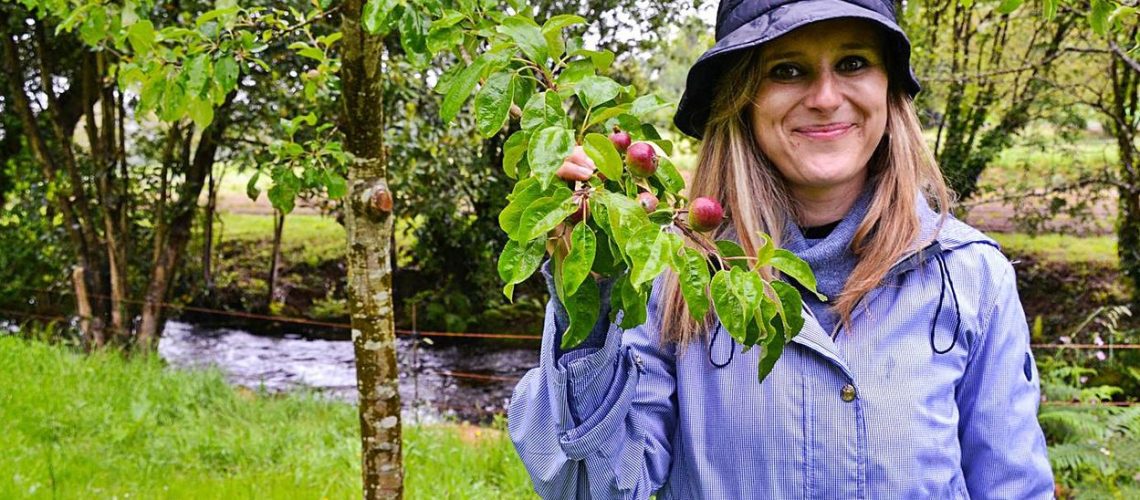Usamos cookies para asegurarnos de brindar la mejor experiencia de usuario en nuestro sitio web.
Consulta nuestros términos de uso


Asturian table apples are looking for a place in the market.
“We want to produce a good quality apple, trying to recover our own”, explains Isabel Rubio, a young rural entrepreneur with a family farm with blueberries, faba beans and avocados.
Ana Paz Paredes, San Cosme (San Martín de Luiña) ,
Isabel Rubio García-Braga is a rural entrepreneur who transmits, from the first moment, the satisfaction she feels with her work. With a double degree in Business Administration and Management and Economics and a Master in Hospitality Management, after working abroad for 13 years, she has been working in San Cosme (San Martín de Luiña) for some time now, working on a farm where her parents had planted blueberries and faba beans, an activity that, in addition to having become her job over time, is, at the same time, also her passion.
“I am delighted to be here. Besides, with the pandemic issue, in the end the whole family is gathered here. For my part, I recently bought a house in Prámaro and I’m 700 meters from the farm,” says this young entrepreneur who, looking back, knows that what was harvested in the past is useful for the future.
“When I arrived I first worked with blueberries, we have one hectare planted with 2,500 plants; marketing, social networks, moving around the area to offer the product and also in the harvest, and then I also joined the Asturian faba bean, within the IGP Faba de Asturias”. Under the name Finca el Ribeiro, the average production packaged as an extra category is around 1,000 kilos per year. “In recent years we have increased the plantation by one hectare, so we expect to produce around 1,700 to 1,900 kilos of faba beans,” she explains.
She goes on to point out that “all the plantations are currently in the process of being converted to organic, so our first organic faba bean harvest will be in 2023. Our project was always to have an agro-ecological farm, and we are working on it with great enthusiasm and a lot of desire.
This rural entrepreneur recalls that, although the pandemic strongly affected the hospitality industry, in her case that effect was not pronounced. “We always sold a lot to stores and supermarkets where people buy our faba beans”. And as the field asks for evolution and she is a restless woman and in contaste evolution and learning, she also has a plantation of table apple trees underway.
“We planted about 300 apple trees, but we lost many to wild boars, which we replanted. You go to the supermarkets and you can’t find Asturian apples for the table, they all come from outside. We want to produce good, high quality apples, even if it is a small production, but we try to recover our own. We plant ten varieties: mingan, prima, priscilla, dayton, liberty, williams pride, florina, reineta encarnada, reineta roja and goldrush. The problem with our apple is getting it to market at a competitive price.
But that’s not all. After acquiring new farms, next week he will also start planting avocados, planting a total of 900 trees of hass and bacon varieties. “Let’s see how it goes, I hope it goes well, this valley is very fertile. We have been controlling the temperature and humidity for the last two years and we are convinced that we will be able to carry out this new plantation,” he says.
Isabel Rubio, who is in contact with other rural entrepreneurs, believes that “today in the countryside there are very qualified people working with their projects in the rural area. More and more people are coming here looking for a more peaceful way of life and having their own business. I believe that agriculture has a future in Asturias. I am here, dedicated to it, and I do not intend to leave”.
FINCA EL RIBEIRO
We are a family from Oviedo that after a long and enriching search throughout the Principality, in the winter of 2007, discovered this place and made the decision to acquire the Finca El Ribeiro.
Follow us
FINCA EL RIBEIRO
Somos una familia ovetense que tras una larga y enriquecedora búsqueda a lo largo y ancho de todo el Principado, en el invierno 2007, descubre este paraje y toma la decisión de adquirir la Finca El Ribeiro.
Síguenos